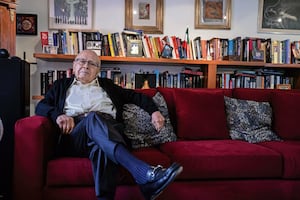Más Información

Extorsión, abuso sexual, drogas y ciberacoso, los delitos latentes para infancias; delincuentes usan videojuegos

Noroña critica “maltrato” a Marx Arriaga y Adán Augusto López; lamenta que le den motivos a la derecha para festejar

Federico Döring amplía denuncia por huachicol; solicita que Julio Scherer comparezca ante el ministerio público

Hijos de presuntos capos mexicanos estuvieron en escuela de élite de EU: Departamento de Tesoro; pagaron hasta 102 mil 235 dólares por año
The security ring protecting Donald Trump includes Secret Service agents, his own private bodyguards, local police, sometimes even the Transportation Security Administration. But even that show of force has not halted disturbing episodes of violence. The only person who can stop Trump from egging on the brawling crowds is Trump himself.
His Secret Service detail is limited to keeping Trump safe and the venues where he speaks secure. Local law enforcement officers are there to keep the peace, along with private security hired either by the venues or Trump.
"The Secret Service is not the word police," said Jon Adler, president of the Federal Law Enforcement Officers Association Foundation, a union that represents Secret Service agents.
Trump denies that he contributes to the violence at events around the country, even though on Tuesday night he predicted "riots" and "a tremendous problem" if Republican leaders try to maneuver the nomination away from him. He has said at a rally he wished he could punch a protester in the face and longed for the days when someone who interrupted a rally would be "carried out on a stretcher."
"Our concern is overt acts of threats to our protected" officials, Secret Service Director Joseph Clancy told Congress on Tuesday. "People have the right to voice their opinions, and it's for the host committee to decide whether or not that's disruptive to that event."
Agents with the campaign detail only advise campaign staff or a candidate about security concerns, Clancy said. The campaign, he added, generally decides whether a protester should be removed - something Trump usually does by saying, "Get'm outta here."
Clancy declined to discuss specific security plans for large rallies.
"There's a lot of give-and-take with all these events," Clancy said. "And there's no question, some of these events create more challenges for us."
In fact, New York police and the FBI are investigating a threatening letter sent Thursday to Trump's adult son Eric.
Trump asked for Secret Service protection in October as his popularity swelled, along with the crowds at his rallies. His federally funded security detail was put in place in early November. The Secret Service has declined to say how many agents have been assigned to protect Trump, citing security concerns.
Such protection is routinely afforded to candidates for president and vice president 120 days before an election. But past candidates, including President Barack Obama, have received protection far earlier. Democratic front-runner Hillary Clinton gets Secret Service protection as a former first lady, and Vermont Sen. Bernie Sanders was approved for a protective detail earlier this year.
Even before federal security protection, private security surrounded Trump during campaign events.
Through the end of January, his campaign reported paying about US$170,000 for security, according to Federal Election Commission filings. That includes, at least, US$55,000 to security firms and local police departments since Trump asked for Secret Service protection.
Noticias según tus intereses
[Publicidad]
[Publicidad]










